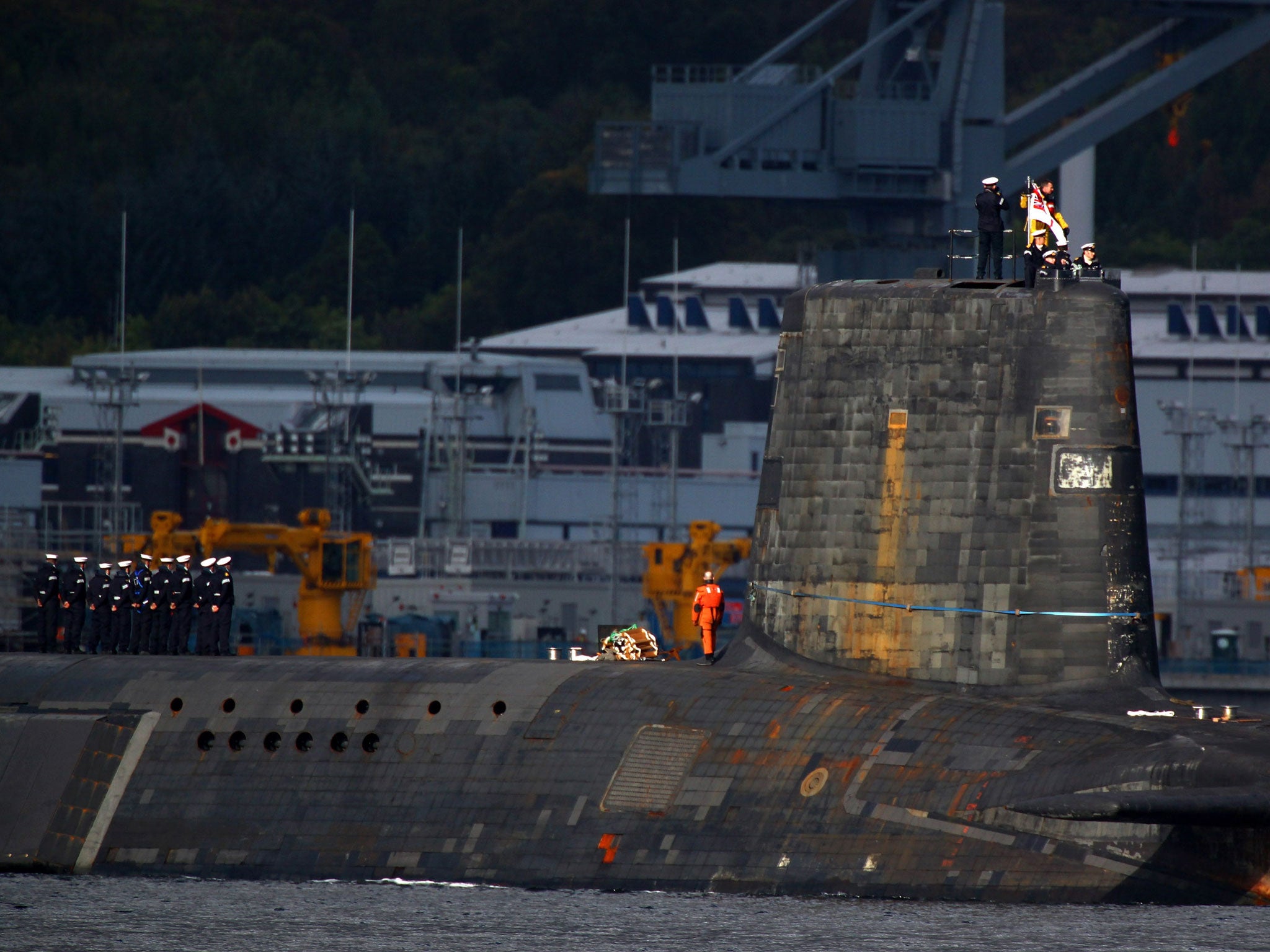Discarding Trident would not aid global nuclear disarmament; it would only imperil UK security
It is imperative that discussions on the nuclear deterrent be driven by national security needs, not short-term political considerations


Your support helps us to tell the story
From reproductive rights to climate change to Big Tech, The Independent is on the ground when the story is developing. Whether it's investigating the financials of Elon Musk's pro-Trump PAC or producing our latest documentary, 'The A Word', which shines a light on the American women fighting for reproductive rights, we know how important it is to parse out the facts from the messaging.
At such a critical moment in US history, we need reporters on the ground. Your donation allows us to keep sending journalists to speak to both sides of the story.
The Independent is trusted by Americans across the entire political spectrum. And unlike many other quality news outlets, we choose not to lock Americans out of our reporting and analysis with paywalls. We believe quality journalism should be available to everyone, paid for by those who can afford it.
Your support makes all the difference.A debate is emerging within the Labour Party over its position on the nuclear deterrent. It is imperative that such discussions should be driven by national security needs and not short-term political considerations. Recent nuclear tests in North Korea, Iran’s nuclear programme and its implications for proliferation in the region and the upgrading by China and Russia of their nuclear systems demonstrate why Labour is right to reject unilateralism. Fears over global proliferation are increasing, and there is no indication that the UK’s admirable world lead in cutting numbers of nuclear systems as well as warheads has had any impact on the behaviour of other nuclear and would be nuclear weapon states. Indeed I think it fair to say that independently discarding our own deterrent would imperil UK security and not accelerate global disarmament.
The renewal of Trident was a decision for this Parliament. Instead, for political reasons, we await the result of a [Liberal Democrat-led] “alternatives review” cynically embarked on to delay the clash between Conservatives and Lib Dems over the future of our Nation’s deterrent.
The focus of the debate has rested on what form our deterrent should take and it is important that it is based on fact and evidence. Numerous studies over the past 40 years have reaffirmed that a submarine based ballistic missile system is the best option if UK is to remain a nuclear weapon state. Having looked at other options in detail it is quite clear that none of them are as cheap or practical as their supporters claim. Labour must not lapse into the belief that an alternative to Trident is better at all costs. I firmly believe that any alternative would undermine our national security.
The options of land or air-based systems need hardly be taken seriously. Both are highly vulnerable to pre-emptive strike and would entail massive infrastructure and platform, delivery and weapons development costs. Similar concerns over cost and vulnerability make a surface ship-based system another thing of foolish fantasy.
The most-often cited ‘alternative’ is Astute submarines carrying cruise missiles, but no such missile exists. The UK would have to develop, test and bring into service a new weapon. Even allowing for the triumph of optimism, such a programme would be complex, fraught with risk (we have not developed such a missile before) and extremely expensive. Cruise missiles have crashed and been shot down; for deterrence to work we need to show we can fire with a guarantee of success. We would have to embark on a new warhead development programme. This would be hugely expensive and could even breach the terms of the Comprehensive Test Ban Treaty. The new missiles and weapon system would have to be regularly and rigorously tested on all measures of performance. At present the US provides all the facilities for Trident test firings, so all of this would be a further cost to our exchequer.
How many Astute class submarines and missiles would be required and should every submarine carry nuclear missiles? Furthermore, cruise missiles will inevitably have less range than ballistic missiles, thus submarines carrying cruise missiles would need to get closer to a target, with consequent risk of detection and destruction. Nuclear-tipped cruise missiles would constitute a growth in our stockpile of weapons ready to fire and could be seen as a reversal of our steady downward pressure on weapon holdings. It may also contravene the Non Proliferation Treaty. If an Astutue class submarine fired a cruise missile, how would an enemy know that it was not a nuclear variant? Would he wait to find out?
The answers to these questions have implications for cost and capability which have not been thought through.
The review will challenge [Trident’s] continuous at sea deterrence. This makes little sense. It saves the UK next-to-nothing financially, and having no ballistic missile submarine permanently at sea would make us vulnerable to a pre-emptive strike. What is more, having to take the decision to arm and deploy our deterrent to sea in a period of tension would risk escalation at the critical moment. Such a decision would also impact immediately on our current deterrent force.
Crucially, the “alternatives review” must identify a clear way forward. To present alternatives ‘for debate’ is unsatisfactory. We are dealing with our nation’s ultimate safeguard in a highly dangerous and chaotic world. The British people will never forgive us if we get this wrong and they expect our guidance. What seems a seductive plan for Labour with a post-2015 coalition in mind is in fact highly dangerous. Nuclear deterrence is too important to get wrong. Trident has been underwritten by the US until 2042 and provides the most effective, affordable option for the UK’s nuclear deterrent capability. The sooner the Labour Party agrees the better.
Lord West of Spithead is a former Chief of the Naval Staff and Minister for Security and Counter Terrorism
Join our commenting forum
Join thought-provoking conversations, follow other Independent readers and see their replies
Comments